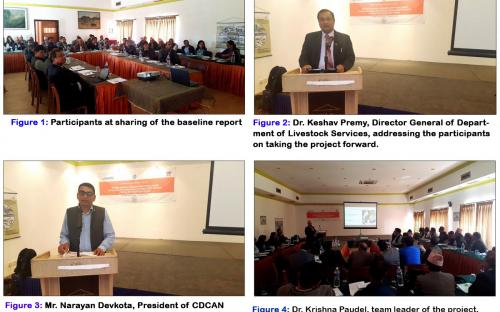Context
Two studies on raw milk supply chain that were supported by Samarth-NMDP support in 2015 reinforced the need for improvement in the quality of raw milk for the commercialization/industrialization of the dairy sector. Key constraints identified included compromised quality of raw milk and the high cost of production per unit volume of milk. To mitigate the quality constraints, Samarth-NMDP through its implementing partner FORWARD Nepal is implementing a project on validation of draft GMP standards, developed by National Dairy Development Board and supported by Samarth. Within the framework of the intervention, a baseline study was conducted during April to July 2016 by FORWARD Nepal to establish pre-intervention scenario of the project. The objectives of the study were to investigate benchmark of current husbandry, milk handling and chilling practices and behaviour, and assess, through laboratory analysis, quality parameters of raw milk at different points in the supply chain. In this context a National Workshop was jointly organised by SAMARTH-NMDP and its GMP implementing partner FORWARD Nepal on November 3, 2016 at Kathmandu. The workshop was held to share among key market actors the baseline benchmarks and project progress updates.
Workshop on Baseline Findings and Progress Updates on Validation of GMP standards in the Raw Milk Supply Chain of Nepal
A one-day workshop on "Baseline Information Sharing and Progress Updates on Validation of GMP Standards in the Raw Milk Supply Chain of Nepal"washeldon 3rd November 2016 at Yak palace, Pulchowk, Lalitpur.The objective of the workshop was to share with dairy market players main findings of the baseline study and the progress achieved in the last seven months from six GMP validation pilot sites. The event was chaired by Dr. Keshav Premy, Director General of the Department of Livestock Services and was attended by total 75 participants from partner milk collection centers, DLSO officials of pilot districts, CDCAN, dairy related associations, processors, DLS officials, DFTQC officials, and other development agencies.
In addition to sharing of the baseline report, representatives from three pilot sites shared their experience, successes and challenges that they faced during the implementation of GMP in the pilot districts. The consensus of the workshop participants was that the draft GMP is implementable with some modifications; however, there is need of additional efforts to achieve success at farm level recording system in the smallholder dairy farm settings.
“The GMP project has gone to places where no other government programs or project has gone. Our collection centers are spread over hard to access regions of Kavre and this is the first time we are receiving such training. Processors have already expressed that milk received from our cooperative is better in quality than it was before we received the training.
Milan Tamang
Marketing Representative
Timal Multi-Purpose Cooperative, Timal, Kavre
Key Takeaway
The participants recognized the fact that many factors influence the quality of raw milk. As milk is a complete food (for microorganisms too), their number increases with time at ambient temperatures. Contamination of raw milk has occurred from poor milking methods, inadequate cleaning of milk utensils, equipment and poor personal hygiene. Subsequent multiplication of the microorganisms over time is severe as evident from the present study - collection centre being the most vulnerable critical point of the raw milk supply chain. Good production and herd management practices help ensure low bacteria counts and reduce the risk of the presence of pathogens in the raw milk. Further microbial growth can be checked by setting minimum standards for collection centre operation and subjecting raw milk to chilling at the earliest possible time - within three hours of milking.
There was also a common understanding that improved raw milk quality will result in reduced spoilage of milk while processing and improved quality of processed milk and its products. Processors recognize the incentives (cost saved and value of high quality products) they accrue once they receive good quality raw milk. This will form the foundation of manufacturing high value milk products. Processors proactive action is required for the application of GMP from farm to dairy plant with equitable distributions of price incentives for quality.
What Next
The event set an enabling environment for implementation of the remaining activities of the on-going intervention and taking initiatives by Central Dairy Cooperative Association Nepal (CDCAN) and processors for its scaling up in new areas. CDCAN proactively expressed its commitment to play pivotal role in mobilizing its member cooperatives in scaling up of GMP adoption. CDCAN also announced its commitment to allocate NPR 1.2 million for implementation of GMP activities in Makwanpur district alone: a bold initiative to achieve GMP in raw milk supply chain in all the member cooperatives in the district. The processors highly appreciated this commitment and extended their preparedness to fund such programmes in partnerships.
The workshop also recommended forming a central level technical committee consisting of key stakeholders both from the government and non-government/privates sectors. This committee will consolidate the findings of the current intervention and facilitate programme planning process for scaling up of GMP intervention nationwide. The key steps will include policy action on quality setting of raw milk; first by setting voluntary and then mandatory standards and their enactment and regulation.
Development Impact
Government agencies have appreciated the outcome and expressed their commitments to continue Samarth's initiatives through DLS network. It is anticipated that CDCAN, dairy processors and DLS will develop annual plans and activities to expand GMP interventions in districts currently supplying larger volume of milk to formal milk markets.
The validation of GMP will be endorsed at the national level and stakeholders will be encouraged to follow the principles of GMP in the supply chain of milk production. Milk produced hygienically based on GMP will not only be preferred by the processors for its quality, it will also protect the smallholders from the loss incurred through damaged milk due to lack of hygiene and provide a secure market to them.
Picture

